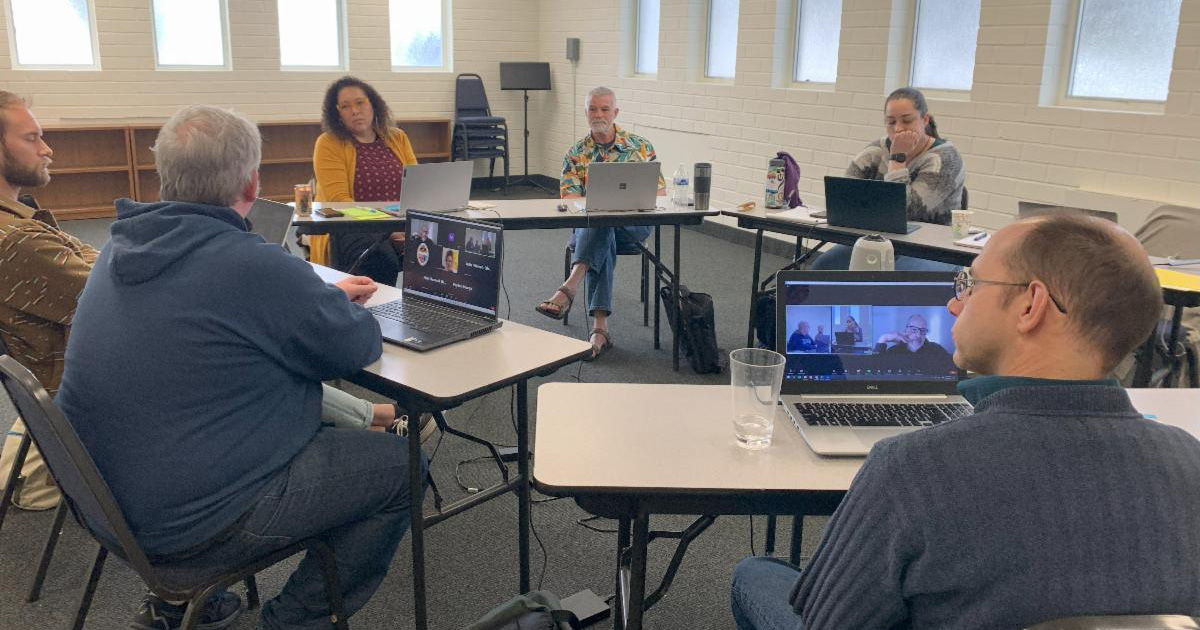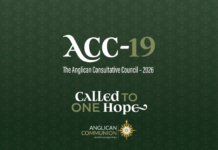Look for big changes, exciting possibilities and “a lot of room to grow” in the very near future for Bloy House – the Episcopal Theological School at Los Angeles – including relocating from Glendale to Echo Park and calling a new dean to oversee classes and operations.
“The possibilities are endless in an era when the national church, as well as we locally, are looking at ways to elevate and empower lay ministry even more than it already is,” according to Linda Allport, Bloy House dean, who will leave her post June 30.
The search for a new dean has begun, chaired by Bloy House trustee Eric Miller of San Gabriel’s Church of Our Saviour. A job description with application information is here. Resumes may be forwarded to Canon Anilin Collado, diocesan missioner for human resources, at acollado@ladiocese.org.
“There are many directions this program could go in,” said Allport, a parishioner at St. John’s Church in Rancho Santa Margarita, who was originally hired to serve a two-year tenure. Health concerns prevent her from remaining longer in the role, she said.
“The sky’s the limit, given the caliber of lay people that we have in this diocese. We lay people have a tremendous amount of wisdom about our experience in the church, and ideas about how that could be expanded, and ideas about collaborative and shared ministry with ordained leaders.”
The quality, variety and diversity of Bloy House’s theological education will remain, said the Very Rev. Gary Hall, who served as interim dean and president from 2020 until Allport’s arrival. Since then, he has continued as president, but he also will leave that post June 30.
“Church institutions everywhere are in transition,” added Hall, who, in addition to his roles at Bloy House, also presided as dean over the federation of Seabury Western Theological Seminary in Evanston, Illinois, with Bexley Hall, and was board chair when the Episcopal Divinity School affiliated with Union Theological Seminary in New York City in 2018.
Since 2016, 60 nonprofit colleges in the United States have closed or merged, 25 of them church affiliated. The Association of Theological Schools reports nine seminary closures in the last decade, most in the last five years, according to a 2021 article in The Christian Century.
Los Angeles Bishop John Harvey Taylor applauded Allport’s and Hall’s leadership through a rapidly evolving theological education landscape.
“President Hall and Dean Allport, working closely with our energetic board, have released Bloy House from its traditional seminary moorings and set sail as a brand-new institution devoted to lay leadership formation, education for the diaconate, and affordable education programs for individuals and institutions,” said Taylor, who is Bloy House board chair.
“Our new lay minister training and licensing program will enable congregational leadership to continue to serve their people and neighborhoods expertly even when a priest isn’t available every Sunday. In this and other ways, Bloy House has become the Christian formation school we need for the church that is taking form.”
Bloy House’s mission always has been to educate lay ministers and those seeking ordination in response to changing needs, according to the school’s website.
The school traces its beginnings to a 1958 Church Divinity School of the Pacific (CDSP) extension program established in the Los Angeles diocese to serve students unable to study at the seminary’s Berkeley campus.
When financial constraints halted that program in 1962, the Rt. Rev. Francis Eric Bloy, third bishop of the Diocese of Los Angeles, took over the program’s operation. It became known as “Bloy House’ and classes were held in a home near the University of Southern California campus, the Rev. Canon Mary June Nestler, a former Bloy House dean and professor, told The Episcopal News in a previous interview.
During that post-World War II era, the area was burgeoning, and Bloy couldn’t get clergy trained fast enough, Nestler said. The school’s founding, she said, was “a response to an evangelical emergency to get people trained.”
In 1967, the school was separately incorporated as the Bloy House Theological School. Three years later the institution moved to the campus of the School of Theology at Claremont (CST), and later became known as the Episcopal Theological School at Claremont. In 2015, the school formed a new partnership with CDSP. The renewed relationship enabled students to earn a Master of Divinity degree at the Northern California seminary while completing much of their coursework at Bloy House through a popular every-other-weekend theological formation program designed for those whose family and employment obligations made three-year residential seminary participation unattainable.
Responding yet again to changes in theological education, the school moved in 2020, to the Lutheran Center of the Evangelical Lutheran Church of America, Southwest Synod, on Colorado Street in Glendale, prompting a name change to the Episcopal Theological School at Los Angeles.
This next move, to St. Paul’s Commons, is expected to happen in July or by year-end, according to a document detailing a proposed five-year plan for the school.

Canon Suzanne Edwards-Acton (center left) leads a Bloy House class. Photo: Bloy House
A five-year vision
Under a new configuration, the diocese will provide financial, development, and communications services for Bloy House. The school’s primary programs will include regular instruction in Anglican Studies for diocesan postulants and candidates and a continuation of the lay licensing program, which netted the institution a two-year, $200,000 grant from Trinity Church Wall Street (New York).
“We will envision a third yearly renewal for the Trinity Church Wall Street grant for lay ministry education and a second yearly renewal for the Trinity Church Wall Street Leadership Across Difference grant,” according to the five-year plan.
About 30 participants have joined a pilot lay licensing program currently underway in the Inland Empire’s Deanery 6 (see related story), which encompasses congregations in the East San Gabriel Valley and includes courses in Episcopal identity, preaching, history, Scripture, and other subjects, said Allport.
While Bloy House had offered formational classes for the laity previously, the lay licensing program represents “a new direction,” she said. “We’ve been fairly successful in getting the word out that Bloy House is here for lay people, that there are classes that can inspire you for your lay ministry and prepare you for expanded lay ministry.”
After a year spent designing curriculum and recruiting instructors, the program “has been very well received,” she added. “We’ve accomplished a lot. We’ve rebranded Bloy House. We’ve explored what are the best methods and ways to bring formation to lay people throughout the diocese. We’ve also made ourselves available as an institution to provide any kind of formation that the diocese needs.”
There’s lots of room to grow in coursework and in congregational participation, Allport said.
“There are many directions for this program. There are still courses to be offered as part of lay licensing, first-time courses. We’ve had good enrollment this year, but in terms of the whole diocese there are many, many churches we have not yet seen anyone enroll from.”
There are also plans for a continuing curriculum once initial coursework is completed under the current program. “For example, we will offer an advanced preaching class, to continue to get better.”
Other potential courses responsive to the diocesan environment may include multicultural awareness and fluency, as well as continuing education classes for clergy, she said.
Although slated to leave her post on June 30, Allport, a former database administrator and computer systems consultant, said she will be available to offer support and assistance to her successor.
“These two years have allowed us to explore new directions, to understand what the framework is for making Bloy House sustainable and to also give us the platform to expand,” Allport said. “I’ve learned a great deal about our diocese and I’m happy about that. The bishop has always been an ally to Bloy House. We couldn’t have done all the things we’ve done without his support.
She added: “This experience gave me a lot of hope for the diocese, just seeing the enthusiasm and the innovative things people are doing, and the dedication both lay and clergy have to their communities is very inspiring. I wish everyone could see it.”
Hall, who was ordained to the diaconate in 1976 and the priesthood in 1977 by Bishop Robert C. Rusack, has served congregations across The Episcopal Church, including as 10th dean of Washington National Cathedral and rector of Christ Church Cranbrook in Bloomfield, Michigan. He also was a senior associate at All Saints Church, Pasadena, and vicar of St. Aidan’s Church, Malibu.
He acknowledged that letting go of the popular weekend program for ordination was challenging, but “also lifegiving, finding this leadership program, finding this new purpose we didn’t have before. It is sad to see the former things go but exciting to see new things coming.”
Hall, 75, will continue to serve the diocese as convener of the Program Group on Mission Congregations and the wider church as a board member for the Episcopal Divinity School at Union Theological Seminary in New York City, as well as finding “some ways to serve the church in a more local, parochial way.”
Presiding over the Bloy House transition “has been an exciting time, but also a time of some sadness,” he said. “We’ve been in this liminal space as an institution. Yet we’ve modeled for parishes and missions the way in which a church institution can go through a transition process and find a new mission in a new situation in new circumstances … a way of negotiating a transition from one way of doing our ministry to a new way of doing our ministry and finding grace and purpose in that.”



